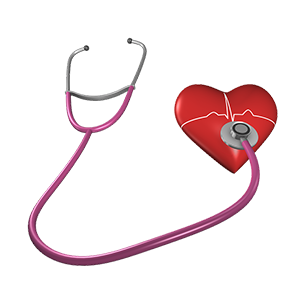Around 65 million Americans have high cholesterol, a condition that can affect anyone from young kids to senior adults. September is Cholesterol Education Month, and you can improve your health when you understand the definition of cholesterol and the best ways to prevent high cholesterol. 
What is Cholesterol?
Cholesterol circulates in your blood and resembles wax or fat. It supports metabolic processes, such as cell membrane stabilization, vitamin D formation, and steroid hormone and bile acid production. It While your body makes cholesterol naturally, it’s also found in food. If you make or consume more cholesterol than your body needs, the excess will accumulate in your arteries and narrow those passageways, which could increase your heart disease and stroke risk.
You have good cholesterol (HDL – high-density lipoprotein), bad cholesterol (LDL – low-density lipoprotein) and triglycerides. The lipoproteins carry cholesterol to and from your body’s cells.
- HDL – Removes bad cholesterol as it flows through your bloodstream.
- LDL – Becomes part of the plaque that lines your arteries.
Your cholesterol levels can depend on several factors, including a family history of heart disease, diabetes, or high blood pressure. Smoking, alcohol consumption, stress, and your weight can also affect cholesterol levels.
What are Normal Cholesterol Levels?
The ideal cholesterol level is under 170 mg/dL. Your LDL level should be under 110 mg/dL, and your HDL level should be over 35. Aim for a triglyceride level of under 150 mg/dL. While these numbers are confusing, your doctor can explain them and help you achieve healthy levels.
How do you know if you have High Cholesterol?
You might have high cholesterol and not know it. Visit your doctor for a blood test that shows your cholesterol levels. Typically, adults over the age of 20 should have their cholesterol checked every five years. High-risk children should have their cholesterol checked regularly, too.
How is High Cholesterol Treated?
Often, lifestyle changes can reduce your cholesterol levels. Your doctor may recommend exercise and dietary improvements, such as:
- Engage in two hours and 30 minutes of moderate exercise or one hour and 15 minutes of vigorous physical activity each week.
- Eat more high-fiber food, including fruits, vegetables and whole grains.
- Limit the amount of saturated fat and sugar in the foods and beverages you consume.
- Maintain a healthy weight.
- Quit smoking and lower your alcohol intake.
- Reduce stress.
Your doctor may prescribe medication, too. Statins reduce the amount of cholesterol your body makes and can lower your bad cholesterol levels.
This month, raise your cholesterol awareness levels. Visit your doctor for a cholesterol check, and discuss the steps you can take to achieve a healthy lifestyle that improves your health now and into the future
Read more
 Renting a house saves you big bucks on vacation since it’s usually cheaper per night than a hotel. Plus, you have amenities like a washer and dryer, kitchen, full bath and maybe even a large backyard. That doesn’t mean, though, that your vacation home is perfect. Like any home, it’s susceptible to thieves, weather damage or other problems.
Renting a house saves you big bucks on vacation since it’s usually cheaper per night than a hotel. Plus, you have amenities like a washer and dryer, kitchen, full bath and maybe even a large backyard. That doesn’t mean, though, that your vacation home is perfect. Like any home, it’s susceptible to thieves, weather damage or other problems.
You might want to invest in insurance coverage as you rent a vacation home this summer.
Make Sure the Landlord has Property Insurance
You don’t plan to go on vacation and have a terrible time, but accidents, bad weather and mistakes happen. Who will pay the bill if the home’s rotted stair railing fails and sends you tumbling off the steps and into the ER? Can you afford to replace an antique vase you or one of your kids accidentally breaks?
In most cases, the landlord’s insurance will cover these accidents. Always ask if the home is covered before you sign a rental agreement, though, to ensure you’re not left covering the bill that should be the vacation home owner’s responsibility.
Make Sure you Have Insurance
Most homeowner and renters insurance policies cover your belongings if they’re lost, stolen or damaged. This coverage applies whether you’re in your home, at school or at vacation.
It’s a good idea to double check your policy before you travel. Add additional coverage if necessary to ensure you are indeed covered for every possible scenario. Ensure the policy is current and paid in full, too. You don’t want to file a claim while on vacation and discover that your coverage lapsed.
Renting a house can be an affordable, comfortable and fun part of your next vacation. Before you sign a lease agreement, make sure the home and your possessions are insured. The peace of mind helps you truly relax and unwind no matter where your vacation takes you.
Read more
 Labor Day is coming soon — which means that you might have children who will be heading off, or back, to college soon. Together with the many lifestyle changes that they (and you) will be making in this time of transition, remember that it’s also important to give your insurance a tune-up.
Labor Day is coming soon — which means that you might have children who will be heading off, or back, to college soon. Together with the many lifestyle changes that they (and you) will be making in this time of transition, remember that it’s also important to give your insurance a tune-up.
A recent industry report recommends considering these types of insurance when Johnny or Sally leaves the nest:
- Auto: Your family coverage will cost less if your student doesn’t take a car. Also, if your child keeps a B average or higher, you might receive a discount.
- Housing: If the child happens to live in a dormitory, your Homeowners insurance might protect them.
- Health: Your child is eligible to receive health benefits through your plan — as long as they’re unmarried, remain in school full time, and are younger than 26 (under the Affordable Care Act) Once they exceed this age, you’ll need to obtain coverage for them from your employer.
These are general guidelines, so please consult with us to make sure you have the right protection at the best possible price. Even if your child already is at school, give us a call and we can make adjustments if needed.
Read more
Do you live within five miles of your workplace like half of all American workers? If so, the 20-minute ride one way burns 3,000 calories and provides key health benefits you’ll appreciate.
Boost Your Energy
Instead of waking up with coffee, tea or energy drinks, ride your bike. A recent study found that a low to moderately paced bike ride releases endorphins that boost your energy level by up to 20 percent and decrease your fatigue by 65 percent. That’s a big wake up call.
Increase Your Heart’s Health
Ride at a moderate to high intensity speed for 30 minutes at least three times a week, and watch your cholesterol and blood pressure drop in one year. You can easily achieve this goal simply by riding the long way home.
Protect Your Joints
Riding your bike is one low-impact exercise that’s perfect if you have joint conditions or leg, ankle, knee or hip injuries. If your knees aren’t bent at a 25-degree angle on your down pedal stroke, ask your bike shop professional for a saddle adjustment.
Improve Your Mental Health
There’s no denying that work and even daily life can be mentally challenging. Use your bicycling commute to regulate your emotions, combat depression and anxiety, prepare for the day or unwind after the day and improve your overall mental health.
Tone Your Muscles
Want to tone your arms, thighs and calves for summer? Riding a bike tones muscles you didn’t even know you had. The pedaling works your lower body, and you’ll tone your triceps and core by pedaling uphill while standing.
Boost Your Immune System
Exercise and fresh air support a healthy immune system. Plus, your body will be stronger and better able to fight germs inside and outside of the office.
Are you ready to jump on your bike and ride to work? Today and every day, gain healthy benefits and have fun simply by cycling. For additional tips on way to stay healthy, talk to your health insurance agent.
Read more


 Renting a house saves you big bucks on vacation since it’s usually cheaper per night than a hotel. Plus, you have amenities like a washer and dryer, kitchen, full bath and maybe even a large backyard. That doesn’t mean, though, that your vacation home is perfect. Like any home, it’s susceptible to thieves, weather damage or other problems.
Renting a house saves you big bucks on vacation since it’s usually cheaper per night than a hotel. Plus, you have amenities like a washer and dryer, kitchen, full bath and maybe even a large backyard. That doesn’t mean, though, that your vacation home is perfect. Like any home, it’s susceptible to thieves, weather damage or other problems. Labor Day is coming soon — which means that you might have children who will be heading off, or back, to college soon. Together with the many lifestyle changes that they (and you) will be making in this time of transition, remember that it’s also important to give your insurance a tune-up.
Labor Day is coming soon — which means that you might have children who will be heading off, or back, to college soon. Together with the many lifestyle changes that they (and you) will be making in this time of transition, remember that it’s also important to give your insurance a tune-up.